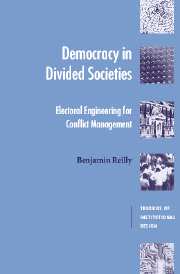Book contents
- Frontmatter
- Contents
- List of illustrations
- List of tables
- Acknowledgements
- List of abbreviations
- 1 Introduction: democracy in divided societies
- 2 The historical development of preferential voting
- 3 Centripetal incentives and political engineering in Australia
- 4 The rise and fall of centripetalism in Papua New Guinea
- 5 Electoral engineering and conflict management in divided societies (I): Fiji and Sri Lanka compared
- 6 Electoral engineering and conflict management in divided societies (II): Northern Ireland, Estonia and beyond
- 7 Technical variations and the theory of preference voting
- 8 Conclusion: assessing the evidence
- References
- Index
4 - The rise and fall of centripetalism in Papua New Guinea
Published online by Cambridge University Press: 22 September 2009
- Frontmatter
- Contents
- List of illustrations
- List of tables
- Acknowledgements
- List of abbreviations
- 1 Introduction: democracy in divided societies
- 2 The historical development of preferential voting
- 3 Centripetal incentives and political engineering in Australia
- 4 The rise and fall of centripetalism in Papua New Guinea
- 5 Electoral engineering and conflict management in divided societies (I): Fiji and Sri Lanka compared
- 6 Electoral engineering and conflict management in divided societies (II): Northern Ireland, Estonia and beyond
- 7 Technical variations and the theory of preference voting
- 8 Conclusion: assessing the evidence
- References
- Index
Summary
One of the abiding influences of colonial rule tends to be the transfer of political institutions from the metropolitan power to the newly autonomous or independent colony. This tendency is well illustrated by the choice of electoral systems by new, post-colonial democracies since the Second World War: nearly all the former British colonies in the developing world at independence adopted Westminster-style systems of government featuring first-past-the-post electoral systems, just as the former Spanish, Belgian and Dutch colonies initially imitated the PR electoral rules of their colonisers (see Reynolds and Reilly 1997; Reilly and Reynolds 1999). Australia's modest twentieth-century experience as the administering trustee for successive League of Nations and United Nations mandates over the South Pacific ‘external territories’ of Papua New Guinea and Nauru was consistent with these trends. The state of Papua New Guinea (see Map 1), which comprises roughly half of the world's second largest island, New Guinea, and about 600 smaller islands, was formed by the merger at independence of the Territory of Papua, which had been under Australian rule from 1906, with the Trust Territory of New Guinea, which had been a German colonial territory from 1884 to 1914, and had thenceforth been administered by Australia – first under military rule, then under a League of Nations mandate granted in 1920, and later under United Nations trusteeship from 1945.
- Type
- Chapter
- Information
- Democracy in Divided SocietiesElectoral Engineering for Conflict Management, pp. 58 - 94Publisher: Cambridge University PressPrint publication year: 2001

